
December 24
1865 KKK founded:
In Pulaski, Tennessee, a group of Confederate veterans convenes to form a secret society that they christen the "Ku Klux Klan." The KKK rapidly grew from a secret social fraternity to a paramilitary force bent on reversing the federal government's progressive Reconstruction Era-activities in the South, especially policies that elevated the rights of the local African American population.
The name of the Ku Klux Klan was derived from the Greek word kyklos, meaning "circle," and the Scottish-Gaelic word "clan," which was probably chosen for the sake of alliteration. Under a platform of philosophized white racial superiority, the group employed violence as a means of pushing back Reconstruction and its enfranchisement of African Americans. Former Confederate General Nathan Bedford Forrest was the KKK's first grand wizard; in 1869, he unsuccessfully tried to disband it after he grew critical of the Klan's excessive violence.
Most prominent in counties where the races were relatively balanced, the KKK engaged in terrorist raids against African Americans and white Republicans at night, employing intimidation, destruction of property, assault, and murder to achieve its aims and influence upcoming elections. In a few Southern states, Republicans organized militia units to break up the Klan. In 1871, the Ku Klux Act passed Congress, authorizing President Ulysses S. Grant to use military force to suppress the KKK. The Ku Klux Act resulted in nine South Carolina counties being placed under martial law and thousands of arrests. In 1882, the U.S. Supreme Court declared the Ku Klux Act unconstitutional, but by that time Reconstruction had ended and the KKK had faded away.
The 20th century witnessed two revivals of the KKK: one in response to immigration in the 1910s and '20s, and another in response to the African American civil rights movement of the 1950s and '60s. (History.com)
1907 Adolf Hitler: following the death of his mother, is invited by relatives to spend Christmas at their home, but he chooses to spend all evening alone, as he will every Christmas Eve for the rest of his life.
1914 World War I: The first air raid on Britain occurs when a German monoplane drops a single bomb on Dover.
1921 Weimar: Walter Rathenau: German Jewish politician writes in the Wiener Freie Presse (Vienna Free Press):
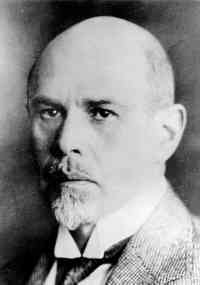
"Three hundred men, all of whom are known to one another, guide the economic destinies of the Continent and seek their successors among their followers." Many anti-Semites, including General Ludendorff, promptly conclude that since Rathenau is a Jew, he must be one of the three hundred and that these are in fact the mysterious "Elders of Zion." Note: Nowhere in Rathenau's original article are Jews mentioned in any context. (THP)
1923 Helium: Time magazine reports that bills introduced in Congress would conserve American helium resources as a monopoly for both war and peace purposes. Up to 500 million cubic feet of helium could be derived from natural gas wells, enough to maintain 200 airships. This amount was contrasted with probably not more than 15 cubic feet of isolated helium held before the World War. The production cost had been reduced to 7 cents per cubic foot, and helium would be preferred to airships inflated with hydrogen which could be exploded by anti-aircraft guns or engine accidents. The article also recognized that helium could be liquefied for easy storage, and that a laboratory in Toronto was producing liquid helium for military purposes.
1930 Death: Eduard David: German minister; Constitution of Weimar. [For further details, Click here.]
1933 Henry Ford denies being an antisemite and states that he never gave financial aid to Hitler or the Nazis.

Henry Ford, industrialist and owner of the Ford Motor Company, was also an outspoken antisemite. In 1920 his newspaper, The Dearborn Independent, published an edition of the faked Protocols of the Elders of Zion, fueling American fears of a Jewish conspiracy. Hitler reprinted Ford's edition of The Protocols in German and awarded him the medal of the Grand Cross of the German Eagle. When war in Europe began, Ford blamed the "Jew bankers" for causing it.
1938 Declaration of Lima is signed by twenty-one American republics, pledging themselves to oppose foreign intervention and to protect themselves by collective action against aggression.
That the peoples of America have achieved spiritual unity through the similarity of their republican institutions, their unshakable will for peace, their profound sentiment of humanity and tolerance, and through their absolute adherence to the principles of international law, of the equal sovereignty of states and of individual liberty without religious or racial prejudices; That on the basis of such principles and will, they seek and defend the peace of the continent and work together in the cause of universal concord; That respect for the personality, sovereignty, and independence of each American state, constitutes the essence of international order sustained by continental solidarity.
1941 Various: World War II:
North Africa: The British Eighth Army recaptures Benghazi, Libya, from the Germans.
War with Japan: The first ships of Admiral Nagumo's Pearl Harbor-fleet return to Japan.
From an order of the commander of the 98th German Infantry Division:
Available stocks of hay, straw, foodstuffs, et cetera, are to be burned. All the stoves in dwelling houses are to be wrecked by placing hand grenades in them, thus making further use of them impossible. This order under no circumstances is to fall into the hands of the enemy.
Romani Genocide: Gypsies are the first targeted population to be forbidden to serve in the army. Eight hundred Roma are murdered in one action on this night in the Crimea.
Joseph Goebbels delivers a Christmas radio speech:
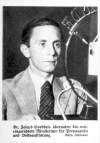
There are few presents under the Christmas tree this year. The effects of the war are evident there as well. We have sent our Christmas candles to the Eastern Front, where our soldiers need them more than we do. Rather than producing dolls, castles, lead soldiers, and toy guns, our factories have been producing things essential for the war effort.
1942 World War II: Various:
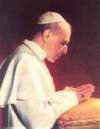
Church and Reich: Pope Pius XII makes another of his many calls for the more humane conduct of hostilities during a lengthy Christmas message over Vatican Radio. Humanity, he said, owed the resolution of a better world to "the hundreds of thousands who, without personal guilt, sometimes for no other reason than their nationality or descent, were doomed to death or exposed to a progressive deterioration of their condition." (THP)
Stalingrad: The Soviet counter-offensive broadens. In the south the Stalingrad Front breaks through the Fourth Romanian Army and strikes for the lower Don. Von Manstein, now threatened both from the North and from the South, is forced to pull back Group Hoth.
Russian Front: The Red army occupies German airports at Tasjinskaja and Morozowsk.
Poland: The Germans execute 300 Poles for partisan activity in the village of Bialowieza.
Wunderwaffen: The German research station at Peenemunde successfully tests a new surface-to-surface weapon system. Called the FZG76, it will later become better known as the V1 Flying Bomb, or Buzz Bomb. [For further details, Click here.]
Death: Francois Darlan: French admiral, administrator of North Africa and a leading figure in the World War II Vichy government, is killed by an anti-Vichy assassin.

French naval officer and senior figure of the Vichy France regime. On the afternoon of December 24, 1942 a 20-year-old French monarchist, Ferdinand Bonnier de La Chapelle, entered Darlan's headquarters in Algiers and shot him twice. Although La Chapelle had been a member of the resistance group led by Henri d'Astier, it is believed he was acting alone. Darlan died a few hours later and de La Chapelle was executed by firing squad on 26 December. Darlan was replaced as High Commissioner by another French flag officer, General Henri Giraud. Generally, Darlan was unpopular with the Allies . . . . it was said that "no tears were shed" at his funeral. Unfortunately, his successor, General Giraud, was not very popular either.
1943 World War II: Various:
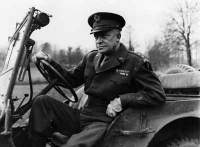
Ike: Washington and London announce that General Eisenhower will be the Supreme Allied Commander for the invasion of Europe, with British Air Marshal Tedder as his deputy.

Dietrich Bonhoeffer: German theologian and Nazi martyr writes from prison: 'Gratitude changes the pangs of memory into a tranquil joy.' (THP)
Romania: Secret negotiations begin in Stockholm between Marshal Antonescu's Romanian emissaries and the Soviet Embassy.
1944 Various:
World War II: Battle of the Bulge: The German offensive in the Ardennes is brought to a halt at the end of the day.

Church and Reich: Now that the defeat of Nazi Germany is almost certain, Pope Pius XII in his Christmas message declares "that a democratic form of government is considered by many today to be a natural postulate of reason itself." (THP)
1946 Various:
France: Fourth Republic is established.
Amnesty: US General MacNarney grants 800,000 'minor' Nazis an amnesty.
1952 Cold War: McCarren-Walter Act goes into effect:
The McCarren-Walter Act takes effect and revises America's immigration laws. The law was hailed by supporters as a necessary step in preventing communist subversion in the United States, while opponents decried the legislation as being xenophobic and discriminatory. (History.com)
1972 Bob Hope gives his last show in Vietnam:
Comedian Bob Hope gives what he says is his last Christmas show to U.S. servicemen in Saigon. Hope was a comedian and star of stage, radio, television, and over 50 feature films.
Hope was one of many Hollywood stars who followed the tradition of travelling overseas to entertain American troops stationed abroad. The 1972 show marked Hope's ninth consecutive Christmas appearance in Vietnam. Hope endorsed President Nixon's bombing of North Vietnam to force it to accept U.S. peace terms, and received South Vietnam's highest civilian medal for his "anti-communist zeal." Although some antiwar protesters criticized Hope for supporting government policies in Vietnam, the comedian said he believed it was his responsibility to lift spirits by entertaining the troops. [For further information, click here]
Note: Bob Hope's achievement in entertaining troops commenced during World War II]
1979 Soviet tanks roll into Afghanistan: On December 24, 1979, the Soviet Union invades Afghanistan, under the pretext of upholding the Soviet-Afghan Friendship Treaty of 1978. [For further information, click here]
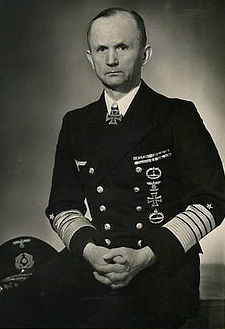
1980 Death: Karl Doenitz: Grand Admiral and, from January 1943, Commander in Chief of the German Navy. Briefly Hitler's heir (Flensburg government).
Edited by Levi Bookin (Copy editor)
levi.bookin@gmail.com
FAIR USE NOTICE: This site may contain copyrighted material the use of which has not always been specifically authorized by the copyright owner. We are making such material available in our efforts to advance understanding of historical, political, human rights, economic, democracy, scientific, environmental, and social justice issues, etc. We believe this constitutes a 'fair use' of any such copyrighted material as provided for in section 107 of the US Copyright Law. In accordance with Title 17 U.S.C. Section 107, the material on this site is distributed without profit to those who have expressed a prior interest in receiving the included information for research and educational purposes. If you wish to use copyrighted material from this site for purposes of your own that go beyond 'fair use', you must obtain permission from the copyright owner.
Please note that the list-owner and the moderators are not responsible for, and do not necessarily approve of, the random ads placed on our pages by our web server. They are, unfortunately, the price one pays for a 'free' website.